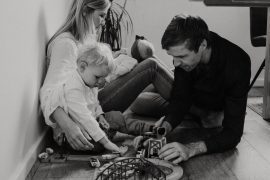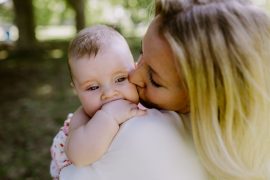By Asta Rudzinskaite
The most amazing and the scariest thing – yes, equally and simultaneously – about becoming a parent is that you have the complete freedom to decide what your intentions and approach to parenting are going to be. There is no one set of rules nor a guidebook that works for all families (although if I had to vote on it, Janet Lansbury’s work would be it for me). There is no one checking on how good of a job you are doing, and the “results” continue to take shape decades later. Absolutely every single subject has parents firmly camping out on various sides of it, and it can suddenly turn out that even the closest friends – or your very own mother – will stubbornly hold equally strong but very different opinions about multiple aspects of parenting.
When we first became parents, we read lots. Because how else do you learn about something that you have no experience in and of which you see few truly inspiring real-life examples? For instance, I was convinced we would raise our children without physical punishment, but for the life of me I simply could not fathom what that meant, because I had never met an adult without that experience. So in books on gentle and respectful parenting, we found the answers – examples, situations, conversation scripts, that helped us learn and – maybe more importantly – unlearn what we thought we knew about raising kids. And then, of course, we really listened to our own intuition.
But then how do you share and clarify all these ideas with your family? How do you communicate something that really really matters to you in a way that helps to avoid misunderstandings or even arguments? Well, believe it or not, when our daughter was a few months old, we actually wrote out a parenting manifesto – a public declaration of our intentions, attitudes and views, which we sent to our closest family members. Crazy? Perhaps. We preferred clarity, authenticity and saw it as an invitation to others to have deeper conversations about the role of parents and the magic of childhood.
So. Here is what we wrote.
Our parenting manifesto
Although Leila might look tiny, we believe she is a full whole person deserving the same respect and understanding as any of us. The following is a list of attitudes and beliefs that help us foster this respect towards her.
Physical World and Movement
- Babies are natural learners and curious explorers of the world around them, so unless something presents a real danger to them, they should have the freedom to move without interruption.
- It might be very tempting to grab her off the floor and lift her up, but imagine how it would feel if your bus suddenly changed its direction without notice. So before lifting her up, ask her or inform her to give her time to prepare (even very small babies tense muscles to prepare for take off). Or better yet, wait for her to show you that she wants to be lifted (Leila shows it by stretching her hands up).
- Babies should be free to move and do not need our help to get to the next developmental stage. For example, there is absolutely no need to “help her learn to walk” by pulling her up by the arms. That only puts her in a position that she is not yet ready for, and results in very sore backs for adults. We trust Leila will walk when she is ready. (Note: she did – I wrote about her first steps here!)
- Leila absolutely does not need to be told or encouraged to “give so-and-so a kiss/hug”, etc. We want her to know and feel that she has a full power of her body, and it is her choice with whom and how she wants (or – even more importantly – doesn’t want) to express her affection. We want her to know this now and when she’s a teen or older.
Communication
- We believe that, while babies might not be able to speak in full sentences, they are ready from birth to start deciphering our communication and express themselves very effectively. They understand much more than we assume, especially our attitudes and being authentic.
- Leila is learning 3 languages at the same time, and the most helpful thing for her is us speaking in the way that we would like her to speak, rather than us “pretending to speak her language”. After all, we would not mimic the accent of a respected guest learning our language. We speak to her in full sentences without any special baby words or baby voice.
- Language skills are not a show nor a performance, so there is no need to test her on them. Once we know she knows the meaning of the word “eye”, there is no need to keep asking her to prove it to us by constantly pointing.
- Just like it interrupts the flow of communication and is rude to correct a foreign guest all the time, Leila also doesn’t need to be corrected. We trust that she will, in time, learn to distinguish the finer details of the languages she is learning.
See next page for more…











